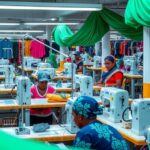Economy
Politics
ANWAR HOSSAIN, ASIA, BANGLADESH, BANGLADESH GARMENT MANUFACTURERS AND EXPORTERS ASSOCIATION, BASH, BASHIRUDDIN, CHINA, DONALD TRUMP, ECONOMY, FOREIGN INVESTMENT, INFLATION, KHALILUR RAHMAN, MEXICO, MUHAMMAD YUNUS, NATIONAL BOARD OF REVENUE, NORTH AMERICA, RA, RAHMAN, RAKIBUL ALAM CHOWDHURY, RDM GROUP, SHEIKH BASHIRUDDIN, STATE DEPARTMENT, TOMMY HILFIGER, TRADE, TRADE DEFICIT, UNITED STATES, US, YUN, YUNUS
Omar El-Sharif
Bangladesh Holds Urgent Talks on US Tariffs Impacting Garment Industry
Bangladesh’s interim leader called an emergency meeting to address US tariff increases on garments that have risen to 37 percent. These tariffs, aimed primarily at cotton and polyester products, threaten Bangladesh’s significant export income. Efforts are underway to engage with US officials, as industry leaders express serious concerns about competitiveness and trade losses.
Bangladesh’s interim leadership convened an emergency meeting following concerns raised by textile and garment leaders regarding recently imposed US tariffs. The industry, representing approximately 80 percent of Bangladesh’s exports, is currently reeling from its recent challenges following last year’s political upheaval.
On Wednesday, US President Donald Trump announced significant tariff increases on Bangladeshi goods, raising duties to 37 percent for cotton and 32 percent for polyester products, up from the previous rates of 16 percent and 24 percent respectively. This development could drastically affect Bangladesh’s annual garment exports to the United States, which amount to $8.4 billion, representing nearly 20 percent of the country’s total garment manufacturing output.
Interim leader Muhammad Yunus ordered this urgent meeting in response to the tariffs, with Commerce Minister Sheikh Bashiruddin affirming plans to address the issue with US authorities. He is optimistic that the impact on Bangladesh may be less severe compared to that on competing nations.
Yunus’s senior advisor, Khalilur Rahman, indicated that preparations for potential tariff increases began months ago, having initiated dialogues with US officials as early as February. Rahman noted the importance of ongoing discussions to determine the necessary responses moving forward.
Meanwhile, the National Board of Revenue, Bangladesh’s tax authority, plans a meeting to evaluate the economic consequences of these tariffs. Industry leaders such as RDM Group’s chairman, Rakibul Alam Chowdhury, warned that competitiveness could decline as buyers might opt for cost-effective alternatives in other nations.
The Bangladesh Garment Manufacturers and Exporters Association has expressed concerns regarding preparedness for this tariff impact. Given Bangladesh’s position as the second-largest garment producer globally, serving major American brands including Gap, Tommy Hilfiger, and Levi Strauss, the ramifications could be considerable.
In summary, Bangladesh is grappling with the repercussions of significant tariff increases imposed by the United States, which could adversely impact its vital garment industry. The interim government is actively engaged in addressing these challenges through discussions with US officials and reassessing the industry’s future amid heightened competition. With the garment sector constituting a substantial portion of Bangladesh’s exports, the circumstances call for strategic measures to mitigate losses.
Original Source: www.breezejmu.org








Post Comment